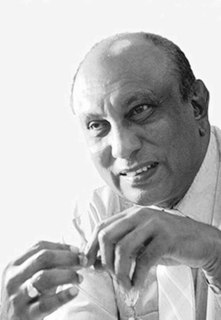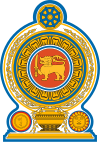
Wanniarachchige Malini Senehelatha Fonseka, popularly as Malini Fonseka is an award-winning Sri Lankan film actress and former member of Sri Lanka Parliament, who became known as the "Queen of Sinhalese cinema". Her cinema career that has spanned many decades began with Tissa Liyansooriya's Punchi Baba in 1968. She first became widely known when she won the 'Best Actress Award' at the 1969 National State Drama Festival This was followed by Sarasaviya Best Actress Awards for Hingana Kolla in 1980, Aradhana in 1982 and Yasa Isuru in 1983. In 2010, she was named by CNN as one of Asia's 25 greatest film actors of all time.
Deshamanya is the second-highest national honour of Sri Lanka awarded by the Government of Sri Lanka as a civil honour. It is awarded for "highly meritorious service", and is conventionally used as a title or prefix to the recipient's name.
The Sri Lankan national honours system is a fully indigenous honours system of titles, decorations and medals which are awarded to recognize achievements of, or service by, Sri Lankans or others in connection with Sri Lanka. Until 1972, the British honours system was in place in Ceylon along with several indigenous titles, however since 1956 no nominations were made for these honours and were automatically discontinued after Sri Lanka became a republic. Since 1981 a uniquely Sri Lankan system of National Honours have been introduced. These awards are titles that can be used by the recipients.

Cathiravelu Sittampalam was a Ceylon Tamil civil servant, politician, Member of Parliament and government minister.

Tissa Ananda Abeysekara was a Sri Lankan filmmaker, actor, writer, director, and screen playwright. He is better known as a script writer for the cinema as well as a film director. In 1996, his book Bringing Tony Home won the prestigious Gratiaen Prize for the new creative writing in English. He was the chief coordinator of FOSWAL in Sri Lanka and honoured awardee of SAARC Literary Award.
Upali Tissa Vitharana is a Sri Lankan physician, politician, former Member of Parliament and former cabinet minister. He is the current leader of the Lanka Sama Samaja Party (LSSP), a member of the United People's Freedom Alliance (UPFA).
The Sri Lanka Sikhamani is a national honour of Sri Lanka "for service to the nation". It is conventionally used as a title or prefix to the awardee's name. Sri Lanka Sikhamani ranks lower than Kala Keerthi.
The Vidya Jyothi is a Sri Lankan national honour awarded "for outstanding scientific and technological achievements". It is the highest national honour for science in Sri Lanka for outstanding contribution to the development of the country through dedicated work in the chosen field. It is conventionally used as a title or prefix to the awardee's name. Vidya Jyothi ranks lower than Veera Chudamani.
Veera Chudamani is a national honour for bravery awarded in Sri Lanka. It is awarded "for acts of bravery of the highest order". It is conventionally used as a title or prefix to the awardee's name. Veera Chudamani ranks lower than Deshabandu.
The Kala Keerthi is a Sri Lankan national honour awarded "for extraordinary achievements and contributions in arts, culture and drama". It is the highest national honour for arts, culture and drama in Sri Lanka. It is conventionally used as a title or prefix to the awardee's name. Kala Keerthi ranks lower than Vidya Jyothi.
The Vidya Nidhi is a Sri Lankan national honour awarded "for meritorious scientific and technological achievements". It is conventionally used as a title or prefix to the awardee's name. Vidya Nidhi ranks lower than Sri Lanka Sikhamani.
The Kala Suri is a Sri Lankan national honour awarded "for special contributions to the development of the arts". It is conventionally used as a title or prefix to the awardee's name. Kala Suri ranks lower than Vidya Nidhi.
The Sri Lanka Thilaka is a non-titular national honour of Sri Lanka awarded "for service to the nation". Sri Lanka Thilaka ranks lower than Kala Suri.
The Veera Prathapa is a non titular national honour of Sri Lanka awarded "for acts of bravery of the highest order". Veera Prathapa ranks lower than Sri Lanka Thilaka.
The Sri Lanka Rathna is a national honour of Sri Lanka for foreigners or non nationals, awarded "for exceptional and outstanding service to the nation". It comprises a citation and a gold medal studded with nine "navaratnas" with a Manel symbol.
The Sri Lanka Mitra Vibhushana is a Sri Lankan honour, for Heads of State and Heads of Government with which Sri Lanka has friendly relations “in appreciation of their friendship towards and solidarity with the people of Sri Lanka”. The recipient of the honour is awarded a citation and a silver medal, which is to be worn around the neck, studded and adorned with nine kinds of Sri Lankan gems (Nawaratna) with the symbols of a lotus, the globe, sun, moon and sheaves of rice. The ribbon on medal 6.5 Centimeters wide. The honour takes precedence over the National Honours awarded to non Sri Lankans, and will be awarded by the President as and when he/she deems fit. The names of all the recipients are contained in a register maintained under the direction of the President for the recipient of National Honours granted to Sri Lankans. The honour was introduced in February 2008 by President Mahinda Rajapaksa.
Deshamanya Rita Genevieve Fernando, better known by her stage name Latha Walpola, is a prominent Sri Lankan vocal artist. It was at church choir time that Latha began to pave her path to becoming one of Sri Lanka's premier singers of her day. Today her fans remember an honor her with the title of The Nightingale of Sri Lanka.
The Sri Lankan Chess Championship is organized by the Chess Federation of Sri Lanka, and was first held in 1972. The Sri Lankan Women's Chess Championship was first held in 1979.
In March 2017 President of Sri Lanka Maithripala Sirisena awarded national honours to 90 individuals for distinguished services. It was the first time in twelve years that awards were given out and there were 426 applicants. The awards ceremony was held on 20 March 2017 at the Nelum Pokuna Theatre in Colombo.

Theodore Hugh Rosslyn Koch was a Ceylonese businessman, company director and politician.







